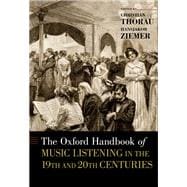An idealized image of European concert-goers has long prevailed in historical overviews of the nineteenth and twentieth centuries. This act of listening was considered to be an invisible and amorphous phenomenon, a naturally given mode of perception. This narrative influenced the conditions of listening from the selection of repertoire to the construction of concert halls and programmes. However, as listening moved from the concert hall to the opera house, street music, and jazz venues, new and visceral listening traditions evolved. In turn, the art of listening was shaped by phenomena of the modern era including media innovation and commercialization.
This Handbook asks whether, how, and why practices of music listening changed as the audience moved from pleasure gardens and concert venues in the eighteenth century to living rooms in the twentieth century, and mobile devices in the twenty-first. Through these questions, chapters enable a differently conceived history of listening and offer an agenda for future research.








